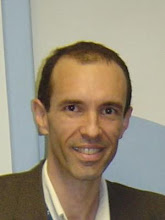WCCE dates approaching, swine flu notwithstanding. I hope the flu doesn't prevent anyone from coming to Bento Gonçalves-RS (Brazil) next week (July 27-31, 2009). Let me tweet about the papers I will be presenting:
- Kern VM, Possamai O, Selig PM, Pacheco RCS, Souza GC, Rautenberg S, Lemos RTS: Growing a Peer Review Culture among Graduate Students (preprint here, slides below).
Thursday 30th, 15:30-17:00, Aud. 3, 2nd paper of 3 (30-min presentation).
Session NET 3.3, Network and Collaboration 3.3 - Kern VM, Saraiva LM, Braz ERC: Emergo: Academic Performance Assessment and Planning with a Data Mart (preprint here, slides below).
Monday 27th, 11:45-12:45, Aud. 2, 2nd paper of 4 (15-min presentation).
Session INNO 1.1, Innovation and creativity in schools 1.1
Hopefully there will be intense feedback in the sessions I'll present or attend to. Excellent opportunity. Slides of my presentations were uploaded to SlideShare, so here they are:
Off-topic update: It was very nice to visit the Guarani indians (from Viamão, near Porto Alegre-RS) booth at the conference site. They have a project and a blog (Jaikuaa - means "to pay attention", "to listen") coordinated by the Federal University of Rio Grande do Sul (UFRGS) in which Guarani youngsters work with camera obscura and production of pinhole photography.
They also play with regular (digital) photo and video cameras. The blog is in Portuguese, with some text in Guarani and in English. And there I am, visiting:








